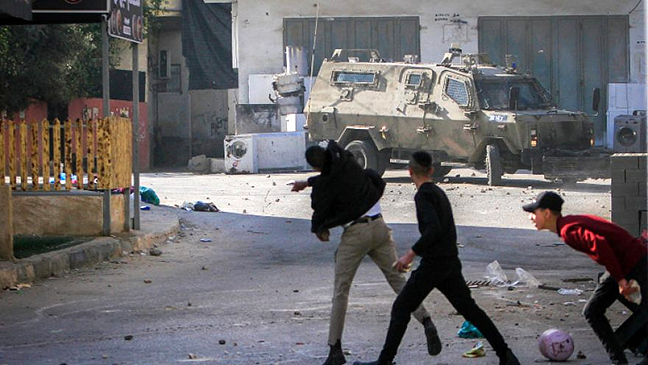Unusual daytime Jenin raid thwarted major, imminent terror attack

Palestinians attack Israeli security forces during a raid in Jenin, Jan. 26, 2023. Photo by Nasser Ishtayeh/Flash90.
by Yaakov Lappin
(JNS) — The decision by Israeli security forces to conduct a large-scale counter-terrorism operation in Jenin during daylight hours on Jan. 26 was unusual, reflecting the urgent need to prevent a major terror plot from moving ahead.
That plot, according to security sources, involved a Palestinian Islamic Jihad attack against Israelis to be carried out in the immediate future.
An Israel Defense Forces spokesman noted that most security operations in Judea and Samaria, commonly known as the West Bank, take place at night, to reduce what the military describes as “friction” — meaning reducing the chances of gun battles and clashes with gunmen and residents. Yet this time, the IDF, Israel Security Agency (Shin Bet) and Border Police’s Counter-Terrorism Unit moved into the crowded Jenin area in broad daylight, employing techniques to maneuver in an urban sprawl that is a hub for heavily armed gunmen.
The daytime timing helps explain the high number of Palestinian casualties, most of them PIJ gunmen.
As security forces closed in on a building, multiple groups of gunmen opened fire on them, and the security forces returned fire.
Nine Palestinians were killed — eight gunmen and a civilian, according to Palestinian reports. There were no injuries among the Israeli forces.
“There was intense fire directed at our forces,” the IDF spokesman told JNS. The return fire struck and killed a number of PIJ gunmen who were in the building in Jenin, and one terrorist turned himself in. IDF Engineering Corps soldiers then detonated explosive devices planted by the terrorists.
As the Israeli forces moved through the building, a terrorist hiding inside opened fire on them, and he too was shot dead. A number of gunmen fled the building, attracting Israeli fire, and they too were struck, said the spokesman.
Additional armed suspects opened fire from outside of the building, and they too were struck by Israeli fire.
According to a joint IDF, Shin Bet and Border Police statement, security personnel entered Jenin to apprehend a PIJ terror squad that had been involved in several recent attacks.
“The operation was based on precise intelligence information provided by the ISA [Shin Bet], which led the Yamam [Counter-Terrorism Unit] police forces, Israel Border Police, IDF and ISA forces into the residence in the Jenin refugee camp in which the suspects were located,” said the IDF.
The Israeli military is reviewing the circumstances surrounding reports of a Palestinian civilian who was hit by gunfire.
The IDF spokesman said the military is prepared for various scenarios of escalation from the Gaza Strip. He recalled how in August, Islamic Jihad attempted to attack Israelis from the Strip — including through the deployment of terror cells armed with shoulder-fired missiles toward the Israeli border — in response to events in Jenin, leading to the three-day “Operation Breaking Dawn.”
“They regretted those actions,” said the spokesman.
Immediate need to act
Col. (res.) Moshe Elad, former head of the Regional Security Committee — coordinator to the Palestinian Authority, told JNS that the daytime timing of the Israeli raid “shows an immediate need to act against this cell, which was planning large-scale terrorist operations.”
Elad, a lecturer at Western Galilee College in Akko, added that Palestinian Islamic Jihad has played a leading role in terrorism in Samaria over the past year, overshadowing Hamas.
Hamas, for its part, has been interested in keeping a low profile in Gaza, said Elad, where it is promoting reconstruction efforts for civilian infrastructure and rebuilding its “military wing.”
“They are trying to keep PIJ from escalating things,” he said. “PIJ is strong in Samaria but its main center of gravity is in Gaza, where it gets its power from. Gaza is where PIJ has its funds and from where it issues instructions to cells in Samaria,” he continued. “In Samaria, PIJ operatives are being hit in IDF operations on a regular basis.”
The Palestinian Authority is not functional in Samaria, said Elad. “Places like the Nablus Casbah and Jenin are exterritorial areas for the P.A. They won’t enter them. Jenin is where the PIJ is most powerful in Judea and Samaria.
“My assessment is that Hamas does not now have an interest in escalation in Gaza. It could allow the PIJ to ‘release a pressure valve’ and fire on open areas. But we cannot know what the response from Gaza will be. The Gazan terror factions are currently holding emergency meetings,” Elad said.
A change in Hamas’s current policy, leading to a significant escalation from Gaza, is rather unlikely but remains a possibility, and if that happens, it would likely be justified by mentions of Israel’s new government, said Elad. “If Hamas does do something, they will blame the new government as the reason for opening fire, even though nothing has changed in reality,” he added.
Hamas has, however, been working continuously to promote terror attacks in Judea and Samaria.
On Jan. 25, the Shin Bet announced that dozens of Palestinians from Judea and Samaria were arrested and questioned on suspicion of being in touch with Hamas.
In response, the Israeli defense establishment revoked permits to enter Israel for work from 230 Gazans who are relatives of some of those in the Strip involved in orchestrating terrorism in Judea and Samaria.



